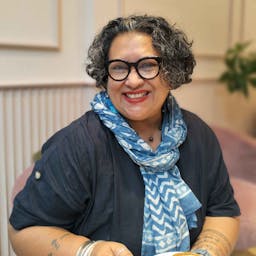Peel Away the Vulnerable Label: Shifting the Power Coalition
Sep 8, 2019
Story
Being classified as vulnerable groups and the lack of awareness are some of the key barriers to shifting the power to enable women of all diversities to lead in humanitarian action.
"It's actually about the barriers we face" says Nelly Caleb
"There are so many barriers that people with different impairments face - not just physical access but also lighting even not having easy to read version books in schools"
"I also acquired my blindness when I was 10 years old and I accepted by blindness. The barriers were the challenges to participate" said Lanieta Tuimabu who also highlighted the invisible disabilities for those with hearing impairments and learning disabilities
And so when it came to category 5 storms in Vanuatu and Fiji the both women have seen how from preparedness to response they have had to tackle the barriers in order to ensure there were inclusive safety and protection standards in evacuation centres as well as claiming a space at the decision making table of the cluster systems - there are multiple barriers which increase the risk during humanitarian emergencies.
A further barrier is access to information and communication said Caleb:
"We need to share information and communication to women with disabilities"
Accessible formats including word versions and powerpoints as well as relying on radio and text - it depends on the disability explained Tuimabu.
"Research in 2016 found in Vanuatu that most women are illiterate and so we have to encourage their families to share information with women and the elderly" explained Caleb adding that in a country that has many disasters including active volcanoes there needs to be better early warning systems to work, there needs to be better telecommunication coverage because information has to reach across the island communities quickly.
Tuimabu and Caleb are active members of the Shifting the Power Coalition since the Pacific Disability Forum supported the formation of the Coalition in 2016.
They were speaking at the training of trainers programme designed to strengthen women’s leadership and disability inclusion in humanitarian action. The training is being held in Nadi, Fiji (6-9 September 2019)
The training convened with support from the DFAT Pacific Women Shaping Pacific Development programme is being led by the Shifting the Power Coalition (StPC) a network of 10 women-led organisations and networks working together across the Pacific region to reshape the humanitarian agenda by embedding feminist practice, women’s rights and leadership in Humanitarian coordination efforts.
"The approach that the Coalition has taken has been inclusive making sure women with disabilities are included and hearing our perspective in the design and programming including our 3 day training. This is how disability rights is mainstreamed in activities and women with disabilities are heard" said Tuimabu
In partnership with the members of the Pacific Disability Forum – Vanuatu Disability Promotion and Advocacy Association (VDPA) and Fiji Disabled People’s Federation (FDPF), the training will bring together 22 women leaders, including women leaders from the disability sector and young women, from Fiji, Bougainville and Papua New Guinea, Samoa, Solomon Islands, Tonga and Vanuatu from the member organisations of the coalition: FemLINKpacific, the Nazareth Centre for Rehabilitation, Talitha Project, Transcend Oceania, the YWCAs of Samoa and Papua New Guinea, Vois Blong Mere Solomon, Vanuatu Young Women for Change, and ActionAid Vanuatu.
The objectives, of the training are to strengthen the capacity of diverse Pacific women to lead inclusive disaster preparedness and response in their communities; to build understanding of the humanitarian systems and opportunities for engagement; to deepen skills in gender and disability analysis and inclusion in times of crisis and to integrate a train-the-trainer component so that learnings can be replicated with a wider group.
Established in 2016, following the devastating cyclones in Vanuatu and Fiji, StPC members from Fiji, Papua New Guinea including Bougainville, Samoa, Tonga, Vanuatu and Australia, and their local and Pacific-wide networks including the Pacific Disability Forum and the GPPAC Pacific network are working together to support women at local, national and regional level to demonstrate the power and potential of our collective leadership
"The majority of persons with disabilities advocating for more inclusive disaster management systems are women" said Tuimabu explaining the work of the Fiji Disabled People's Federation which has included research, capacity development and advocacy.
Caleb and Tuimabu both say it has taken determination and persistent advocacy to engage in the Humanitarian and DRR system. Collaboration through the Coalition is a way to ensure full inclusion of disability rights within the work to progress gender equality and women's rights within disaster management and humanitarian systems.




